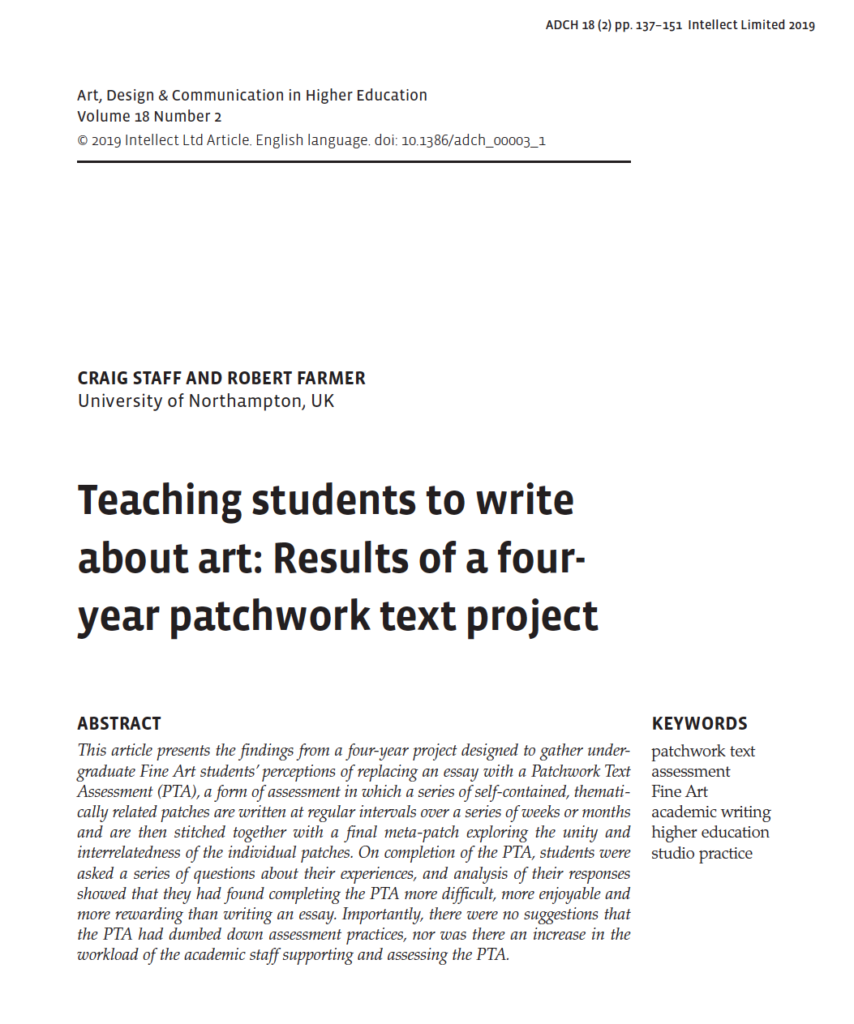Dr Craig Staff, Reader in Fine Art, and Robert Farmer, Learning Technology Manager, have published an article in the latest edition of Art, Design and Communication in Higher Education, a special edition on the theme of democratizing knowledge in art and design education. According to the journal’s editor, Professor Susan Orr, Dean of Learning/Teaching & Enhancement at University of the Arts London “The authors make a strong argument that the patchwork text approach works well within a creative education context, where experimentation and risk-taking are valued.”
The article itself presents the findings from a four-year project designed to gather undergraduate Fine Art students’ perceptions of replacing an essay with a Patchwork Text Assessment (PTA), a form of assessment in which a series of self-contained, thematically related patches are written at regular intervals over a series of weeks or months and are then stitched together with a final meta-patch exploring the unity and interrelatedness of the individual patches.
On completion of the PTA, students were asked a series of questions about their experiences, and analysis of their responses showed that they had found completing the PTA more difficult, more enjoyable and more rewarding than writing an essay. Importantly, there were no suggestions that the PTA had dumbed down assessment practices, nor was there an increase in the workload of the academic staff supporting and assessing the PTA.
The full article can be viewed and downloaded here: https://doi.org/10.1386/adch_00003_1

In an October 2014 blog post we looked at patchwork text assessment and discussed some tentative findings from the first year of a three year patchwork text project being run in the School of The Arts by Dr Craig Staff (Senior Lecturer in Fine Art) and Rob Farmer (Learning Designer). We have now collected the data from the second year of the project, so now seems like a good time to provide an update on how things are going.
The patchwork text project is designed to assess whether changing an undergraduate assessment from an 2,000 word essay to a 2,000 word series of blog postings improves the quality of the assignment submissions. In addition to this, the project is looking at impact on the student experience of this change and the impact on the workload of the staff assessing the blog postings.
So far, 235 participants have taken part in the project, which involves students from three Fine Art modules at levels 4 and 5. Of these participants, 58 (24.7%) have provided feedback to us via a voluntary and anonymous survey. In addition to the quantitative data we have collected, we also have over 3000 words of qualitative feedback, and we are now getting clearer picture of how these students feel about this type of assessment.
Whilst we don’t want to say too much until the end of the project when we will have examined the data is detail, the picture that is emerging so far is that the majority of survey respondents are feeling positive about the change from an essay to a patchwork text assessment. For example, of our respondents, 74.1% said that they liked being able to build up the writing over a series of entries, 70.7 felt that it made the writing process easier and more manageable, and 79.3% said that they would be happy to complete other assignments this way. And when it comes to their perceptions of their grades, it looks as if the respondents felt that they did slightly better in the patchwork assignment than they normally do in written assignments – but more data and analysis is needed here before we make any claims regarding the statistical significance of this particular finding.
One theme that has begun to emerge from the qualitative data is that patchwork text assessment can be difficult, especially at first, because the low word count for the individual entries means that students have to write in a very concise, precise and focused way. However, in most cases students manage to overcome this difficulty in the first few blog entries and ultimately appreciate developing the skills involved in this type of writing. Comments from students on this theme include:
“The process of summarising a topic and ‘making every word count’ can be demanding, but it is not without rewards.”
“At first I found it really difficult, trying to get such broad subjects into 250 words but by the end I was better able to evaluate and edit my work into a cohesive and intense 250 word blog.”
“I found that having to condense the key points of a particular topic into 250 words was extremely difficult. However, this forced me to think about the topic a lot more, and I found that it really helped with learning about each topic.”
“After writing a few blog entries, I felt more confident in what I wanted to say. What I mean by this is that my writing became more prescribed and focused, rather than writing ‘waffle’ as it were and rambling on. This has also helped me massively, in terms of my own artistic practice. It has enabled me to pinpoint exactly what my work is about.”
“The blog was a really good way to ease into the discipline of academic writing again. I settled into the work as my blog progressed, however I did find the word cap a little frustrating, particularly when I wished to add more substantial content. That said, this forced me to be concise and helped me to focus closely upon the salient points.”
“The nature of the patchwork essay is very positive. Having a restricted word count for each entry made the research more vital to certain key areas of the weeks lecture. This forced me to narrow down issues that seemed important/relevant or most interesting and link these to the overarching theme or topic of discussion at the given time.”
Nevertheless, the old adage that you can’t please all of the people all of the time still rings true, and not all of our responses were positive. A few students found it very difficult to get beyond the frustration of having to keep the word count at 200 words per entry, but fortunately these were in the minority, and hopefully this is something that we can work on addressing as the project moves forwards.
 In 2003, Richard Winter wrote a piece for the Guardian in which he listed some problems than can occur when essays are the primary tool used to assess what, and how much, students have learned. Winter claimed that the essays students write often show evidence only of surface learning, rather than deep learning, and that the use of essays for assessment was partly to blame for this. Personally speaking, I really like the essay. I find it stimulating, challenging, and an opportunity to examine and learn in great detail and depth. However, regardless of how much one might like the essay, sometimes it could be useful to provide students with a friendly way in to academic writing, especially for first-year undergraduates or those returning to education after a break, and this is where patchwork text assessment comes in.
In 2003, Richard Winter wrote a piece for the Guardian in which he listed some problems than can occur when essays are the primary tool used to assess what, and how much, students have learned. Winter claimed that the essays students write often show evidence only of surface learning, rather than deep learning, and that the use of essays for assessment was partly to blame for this. Personally speaking, I really like the essay. I find it stimulating, challenging, and an opportunity to examine and learn in great detail and depth. However, regardless of how much one might like the essay, sometimes it could be useful to provide students with a friendly way in to academic writing, especially for first-year undergraduates or those returning to education after a break, and this is where patchwork text assessment comes in.
The basic idea is that rather than choosing one or two major points of assessment, the students submit multiple short pieces of writing on a regular basis (perhaps in the form of an academic blog or journal) which are then ‘stitched together’ with a final summary, evaluation or reflective commentary. The learning outcomes remain the same, the word count is not altered, and the final submission deadline stays as it is: the difference is that the writing is built up over a longer period of time, in which the students complete many short, directed writing tasks. The writing tasks could be similar or varied, and could be shared for peer-review or kept private. Tutors could review the writing tasks at one or two specific intervals in order to provide formative feedback, or could simply mark everything at the end of the process.
Dr. Craig Staff (Senior Lecturer in Fine Art) and Rob Farmer (Learning Designer) are currently conducting research into patchwork text assessment with students in the School of The Arts. The purpose of the research is to study the attitudes of students to this type of assessment, to look at the quality of the writing they produce, and to determine the staff workload implications when assessing the patchwork texts. The project is due to run over three academic years (2013/14, 2014/15, 2015/16), and will involve around 300 students from levels four to six. Interim findings from the students who undertook the patchwork assessments in 2013/14 clearly showed that it would be worthwhile continuing with the project.
Find out more …
Read Richard Winter’s 2003 Guardian article ‘Alternative to the Essay’
Visit the patchwork text pages of Richard Winter’s website
Visit the Digitally-enhanced Patchwork Text Assessment (DePTA) JISC project website
Recent Posts
- Learning Technology Team Newsletter – Semester 2, 2023/24
- Getting started with AI: A guide to using the Jisc Discovery Tool’s new AI question set.
- Blackboard Upgrade – April 2024
- Exploring the Role of GenAI Text to Enhance Academic Writing: A Conversation with Learning Development Tutor Anne-Marie Langford.
- Interview with the University’s Digital Skills Ambassador
- Blackboard Upgrade – March 2024
- Case study: GenAI in BA Fashion, Textiles, Footwear & Accesories 2024
- Exploring the Educational Potential of Generative Artificial Intelligence: Insights from David Meechan
- Exploring the Fusion of Fashion and Artificial Intelligence: Jane Mills’ Pioneering Journey – Vulcan Sessions Talk.
- Artificial Intelligence Meets Drama: Matt Bond’s PlayAI Project Chronicles the Journey
Tags
ABL Practitioner Stories Academic Skills Accessibility Active Blended Learning (ABL) ADE AI Artificial Intelligence Assessment Design Assessment Tools Blackboard Blackboard Learn Blackboard Upgrade Blended Learning Blogs CAIeRO Collaborate Collaboration Distance Learning Feedback FHES Flipped Learning iNorthampton iPad Kaltura Learner Experience MALT Mobile Newsletter NILE NILE Ultra Outside the box Panopto Presentations Quality Reflection SHED Submitting and Grading Electronically (SaGE) Turnitin Ultra Ultra Upgrade Update Updates Video Waterside XerteArchives
Site Admin


